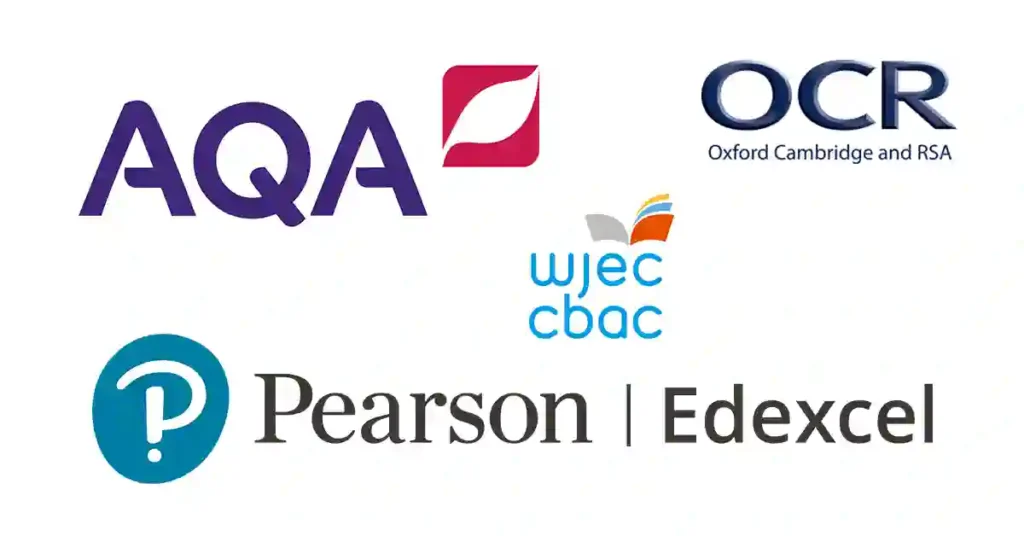AQA vs Edexcel: An Overview
The education system relies heavily on standardised assessments to evaluate student knowledge and skills. Two of the main exam boards, AQA (Assessment and Qualifications Alliance) and Edexcel, play a significant role in conducting these examinations as awarding bodies. Among the different GCSE exam boards available to students in the UK, AQA and Edexcel are prominent options. While both boards have a shared goal of assessing students, there are distinct differences between AQA and Edexcel in terms of ownership, exam offerings, assessment methods, syllabus and curriculum, grading systems, and teacher support. So then, what’s the difference between AQA and Edexcel?
What are GCSE Exam Boards?

GCSE exam boards are pivotal organizations in the UK education system, responsible for designing, administering, and marking GCSE exams. These boards ensure that the exams are fair, valid, and reliable measures of student achievement. Among the various GCSE exam boards in the UK, AQA, Pearson Edexcel, OCR, and WJEC (aka Eduqas) are the most prominent.
Exam boards have their own unique strengths and weaknesses, offering different approaches to subjects and assessments. Schools and colleges have the flexibility to choose the exam board that best aligns with their educational goals and the needs of their students. This choice can significantly impact the teaching approach, exam preparation, and ultimately, student performance in GCSE exams.
Background of AQA & GCSE Exam Boards
Firstly, it is essential to understand the background and history of both exam boards. The AQA exam board was established in 2000 as an independent non-profit organisation, following the merger of three exam boards: the Assessment and Testing Council, the Northern Examinations and Assessment Board, and the Southern Examining Group. On the other hand, Edexcel, formerly known as the London Examinations Board, has a longer history, dating back to the mid-19th century. Edexcel is currently owned by Pearson, a multinational publishing and education company.
Organisational Structure

Ownership and structure also set AQA and Pearson Edexcel apart. AQA operates as an independent organisation with a board of trustees, consisting of representatives from various educational backgrounds. It is accountable to regulators, such as Ofqual (Office of Qualifications and Examinations Regulation), ensuring fairness and quality in assessments. In contrast, Edexcel is part of the Pearson Group, which provides a wider range of educational services beyond exams. Pearson Edexcel collaborates with expert specialists for exam paper design and offers a broad range of qualifications, highlighting the significance of understanding the distinct features and approaches of different exam boards.
AQA vs Edexcel exams

The exam offerings of AQA and Edexcel differ in terms of subjects, levels, and vocational qualifications. AQA offers a broad spectrum of subjects, including sciences, humanities, arts, and languages, for both General Certificate of Secondary Education (GCSE) and Advanced Level (A-level) qualifications. AQA exams require students to write structured answers and include a significant amount of coursework, which can lessen exam pressure. Edexcel, similarly, provides a wide range of subjects at the GCSE and A-level levels. However, it also offers vocational qualifications such as BTECs (Business and Technology Education Council) and NVQs (National Vocational Qualifications), allowing students to pursue more specialised career pathways.
Assessment Methods
When it comes to assessment methods, AQA and Edexcel employ different approaches. AQA places emphasis on coursework and practical examinations, in addition to written examinations. This allows students to demonstrate their knowledge and skills through a variety of assessment formats. In contrast, Edexcel predominantly uses written examinations, with some subjects incorporating coursework and practical components. The weighting and format of assessments may vary between the two exam boards. For instance, GCSE maths exams under AQA and Pearson Edexcel differ in their format and grading standards, with AQA typically having lower grade boundaries. It’s also a debate often between students and teachers alike, which examination board has the more difficult question styles, with the argument of AQA and Edexcel both assessing similar / the same content coming up. Interestingly, both tend to have multiple choice questions for GCSE Science and other subjects to assess the Assessment objectives for factual recall.

How does the syllabus/specification differ?
Syllabus and curriculum requirements also differ between AQA and Edexcel. A GCSE exam board is responsible for setting and maintaining standards for exams in different regions of the UK. While both boards cover similar topics, there may be variations in the depth of study and approaches to assessment objectives. Teachers and students need to be aware of these differences when preparing for exams, as the content and emphasis may vary. There is a fair overlap between the content of both but also certain topics may be covered in one exam board and not the other. GCSE exam boards explained: Different boards like AQA and Edexcel operate with their own methodologies, but grading remains fair across all boards, ensuring students are assessed consistently.
What you probably want to know:

It’s usually fair to say that most students sitting an AQA paper would score the same level / grade on an Edexcel paper.
Exam Papers and Revision Resources
Exam papers and revision resources are indispensable tools for students gearing up for their GCSE exams. These resources are meticulously designed to test students’ knowledge and understanding of the subject matter. AQA, Edexcel, and OCR are among the leading exam boards that provide a wealth of exam papers and revision materials. These include practice questions, past papers, and comprehensive study guides, all aimed at helping students prepare effectively for their exams. Accessible through the exam boards’ official websites or various online revision platforms, these resources offer students the opportunity to familiarize themselves with the exam format, practice time management, and identify areas needing improvement. Utilizing these tools can significantly enhance a student’s confidence and performance in their exams.
Choosing an Exam Board

Selecting the right exam board is a crucial decision for schools and colleges, as it can influence the content, format, and grading of exams. AQA, Edexcel, and OCR are among the most popular choices, each offering distinct advantages. When choosing an exam board, educational institutions should consider several factors, including the specific content and structure of the exams, the grading system, and the level of support provided by the exam board. For instance, a particular examining board may offer more comprehensive resources or better alignment with the school’s teaching style. Ultimately, the decision should be guided by what will best serve the students’ educational needs and the school’s objectives, ensuring that the chosen exam board supports optimal learning outcomes and exam performance, especially in the core subjects.
Grade Boundaries – AQA vs Edexcel Grade Boundaries
Grading systems also set AQA and Pearson grade boundaries, grade descriptors, and grading scales. Whichever exam board is chosen, students can be confident in the fairness and standardized quality of the grading. While the overall grade structure is similar e.g both award grades 1-9, there may be subtle variations in the criteria for each grade that set AQA and Edexcel apart.
Conclusion
In conclusion, the difference between AQA and Pearson Edexcel exam boards isn’t black and white – so there’s no ‘best exam board.’ AQA and Edexcel examination boards are two similar exam boards each with their own unique characteristics. While AQA operates as an independent organisation, Edexcel is owned by Pearson. The exam offerings, assessment methods, syllabus and curriculum, grading systems, and teacher support differ between the two examination boards. Understanding these differences is crucial for students, teachers, and educational institutions to make informed decisions.

